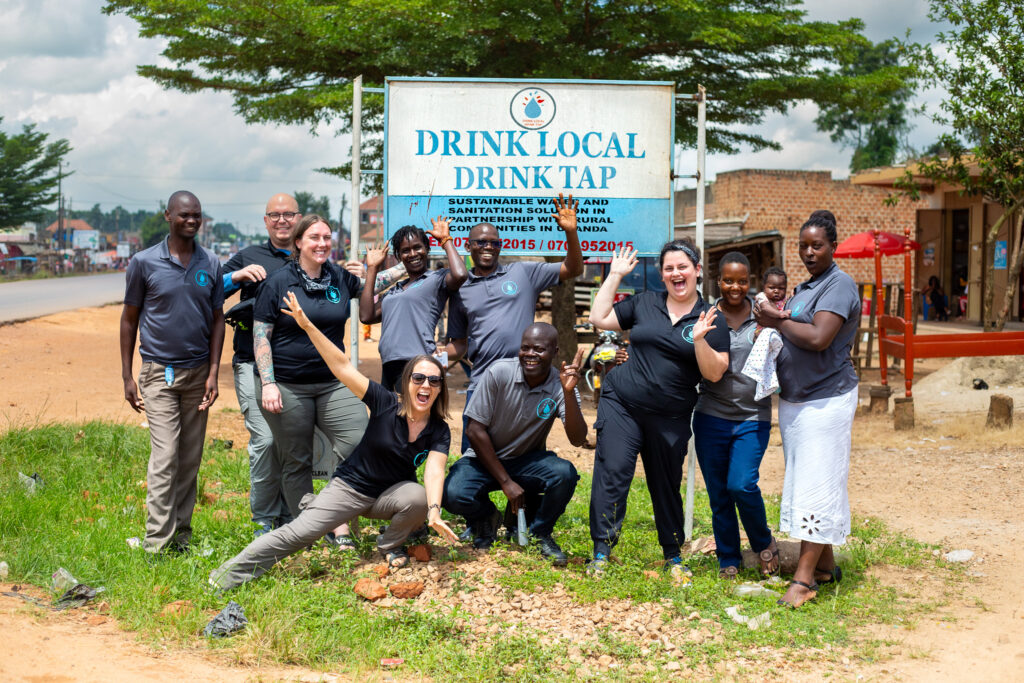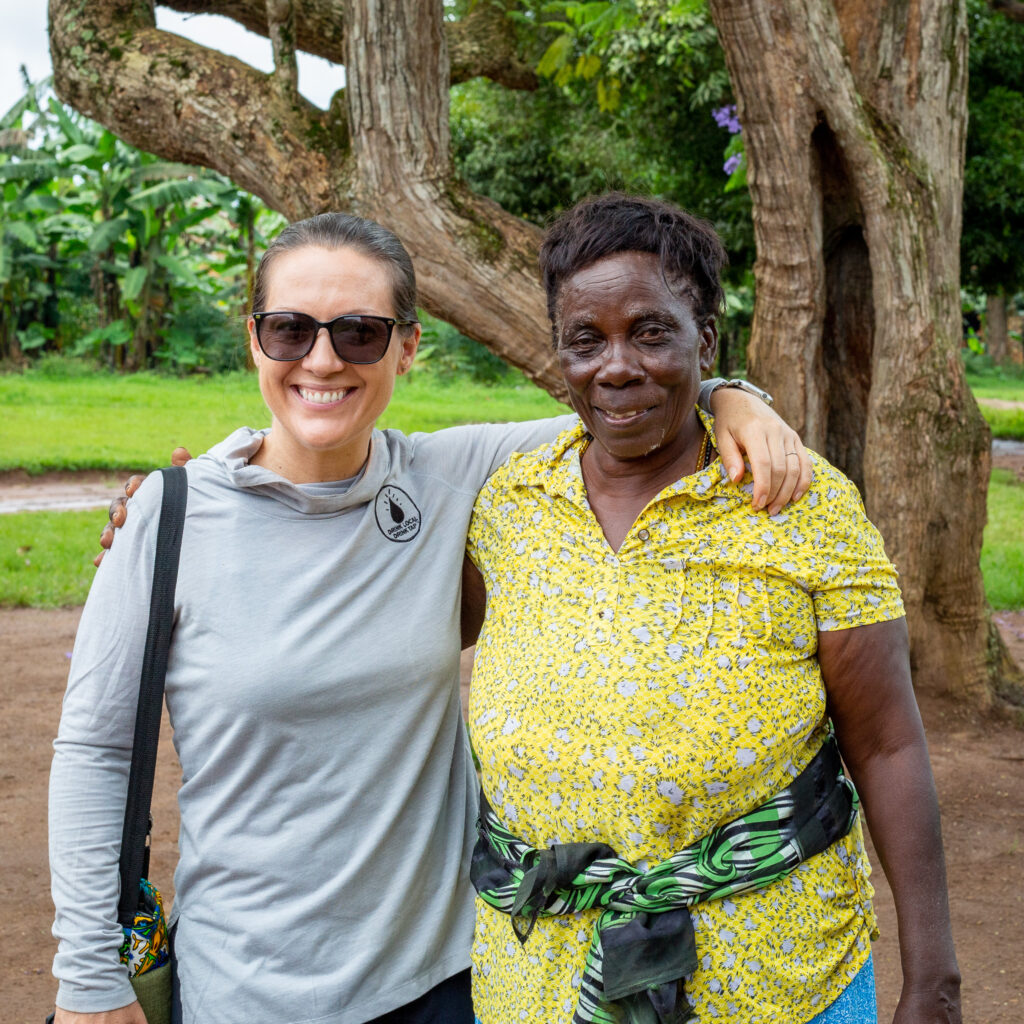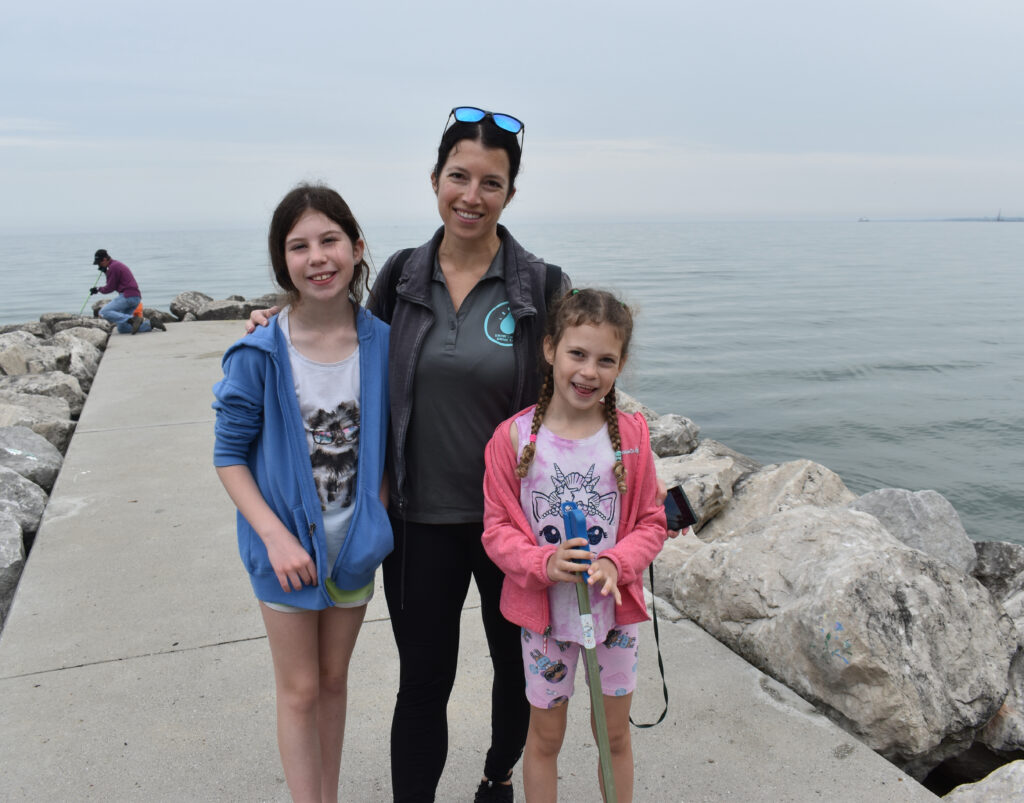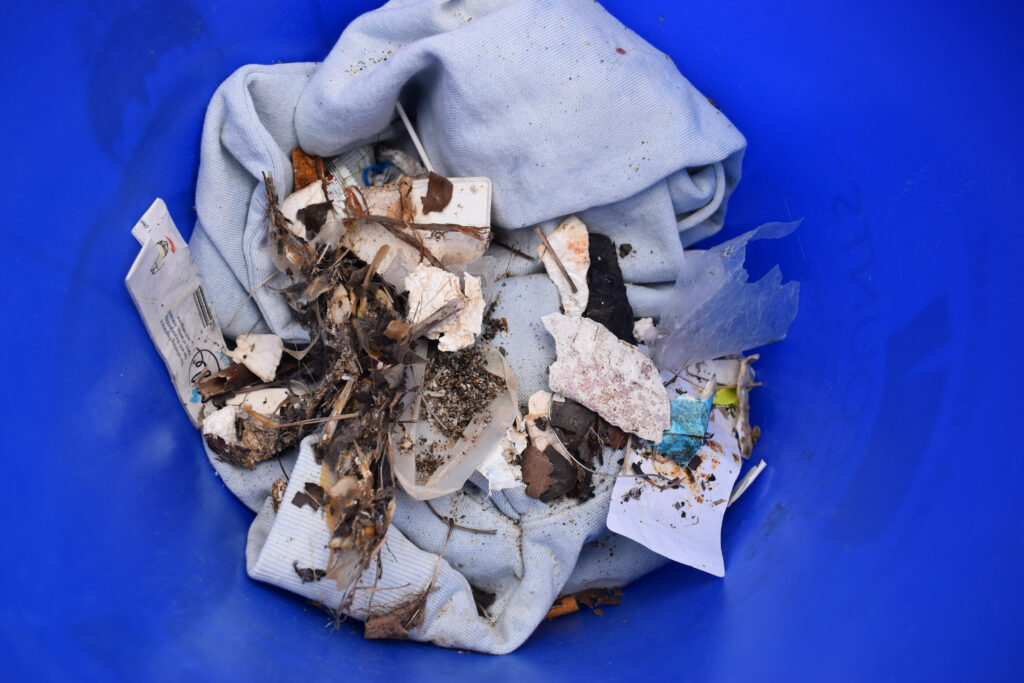By Amanda Koehn

Photo courtesy of Jo Levin / Drink Local Drink Tap
On a weekend morning in mid-May, about 50 volunteers gathered at Edgewater Beach in Cleveland for the first beach cleanup of the year hosted by the local nonprofit Drink Local Drink Tap. It was foggy and softly raining as they picked up litter throughout a section of the beach.
Cigarette butts, tiny plastic and foam plastic pieces, aluminum cans and fishing lures were common finds on the shore. And while cleaning up trash that should never have been there in the first place is not the entire solution, it helps – and it educates and reminds those volunteering about the importance of keeping our waterways and environment clean.
Across the world in Uganda, at the same time, DLDT’s staff was working on clean water and sanitation projects in various districts of that country. It’s all connected to the nonprofit’s mission of clean water as a human right.
When Erin Huber Rosen started the grassroots organization in 2010, her intention was to educate about clean water and build equitable solutions for making it more accessible worldwide. The rural Uganda projects contribute to addressing the growing problem of global water insecurity, which naturally connects to the Jewish values held by some of the organization’s leaders. And, DLDT’s goals for ensuring equitable and clean water here and abroad are still expanding.
“We’re growing a lot on two continents,” says Huber Rosen, who converted to Judaism and was married by Rabbi Enid Lader, who recently retired from Beth Israel-The West Temple in Cleveland. “We have 10 very strong team members, and to me that is really exciting because all those people, they’re the ones out there making the real impact and doing the real work, and to see that team growing has been exciting.”
HOW IT STARTED
Huber Rosen, the executive director and founder of DLDT, grew up in Mentor and says she has always been drawn to community service, starting her first nonprofit when she was 16. On weekend nights, she brought homeless people in Cleveland peanut butter and jelly sandwiches and blankets, specifically focusing on men’s shelters as she saw a gap in services for men in need.
“When I was 16, I was helping and going to soup kitchens and starting my homeless organization at the time, and volunteering for Habitat for Humanity, and doing whatever I could,” she tells Jstyle.
After earning two associate degrees at Cuyahoga Community College, she graduated from Cleveland State University in environmental science. She also earned her master’s degree at CSU.
She considers the start of DLDT as March 22, 2010 – World Water Day – when she started its first campaign and adopted Edgewater Beach.
The necessity of clean water to survive was the reason Huber Rosen first decided to work in water issues, but wasn’t sure what her organization would look like.
“I care a lot about the environmental aspects of keeping our water clean and sustainable for future generations,” she says. “I care about keeping it resilient with climate change. I care about people having access to it and making sure that water is equitable. It’s a basic human right. I founded Drink Local Drink Tap really to protect the water that we have and help other people who don’t.”
She began talking in Cleveland schools about water issues. At one school, she met a teacher from Uganda who had letters from students from the country. The letters said bluntly, “We don’t have water.”
WORK IN UGANDA
In DLDT’s first year, water in Uganda was an issue Huber Rosen wanted to explore. When she first went to rural Uganda, she notes that she was in “learning mode.”
“There’s a lot of good-hearted people in the world that go to other countries and want to solve problems,” she says, adding despite good intentions, having a “savior mindset” for addressing problems in countries and cultures that are not one’s own – and not involving and listening to that community and culture throughout –
can bring about unhelpful or even harmful outcomes.
Eventually, she and the Uganda staff she hired did begin their first water project there.
“I learned a lot of very difficult lessons,” she says from Uganda. “That project is still working and serving a lot of people, but now we have 130 projects. So, something kept me here. It’s not an easy place to work. It’s a very difficult place to work, but that’s kind of why I want to work here.”
Huber Rosen adds much of her training is hands-on and she works with hydrologists, engineers and a construction team in Uganda, “constantly improving the way that we do things.” She manages that team, but in many ways, they are the ones teaching.
During the May 2023 trip, while Huber Rosen, a Cleveland resident, was on site working for a month, the rest of the American-based staff came for 10 days to help with projects and get to know the Uganda-based staff. With 10 staff members altogether, the organization has grown over more than a decade in service, and this was an opportunity for them all to meet in-person.
The 130 Ugandan projects are across several rural Ugandan districts, involving building and maintaining clean water systems, and hygiene and sanitation facilities.

Photo / Jo Levin / Drink Local Drink Tap
Another staff member visiting from Cleveland was Jo Levin, DLDT’s marketing and communication coordinator. On Zoom from Uganda, Levin explains that the four full-time staff members in Uganda are leaders on the ground. They travel to manage and educate about the organization’s projects throughout the country. Part-time employees also represent DLDT in various districts.
Levin cites that water projects around the world have a high failure rate. One reason is that when aid is used to build infrastructure communities are not familiar with, they don’t become accustomed to it as an option. Climate change also has an impact, as weather conditions for agriculture and water needs are changing. Thus, having leaders within the communities the projects are in is essential.
“It wouldn’t be possible to do our work the right way without the people from communities in which we work,” Levin tells Jstyle, adding that the organization is “still very small.”
Today, the three tenets of the organization are engagement, equity and education – all of which have components both across Uganda and here in Cleveland.
CLEVELAND COMPONENT
Headquartered in Cleveland, DLDT advocates for clean, safe, affordable drinking water and sanitation services.
Here, the educational component is accomplished through beach cleanups, networking and the Wavemaker student program. The Wavemaker Program takes DLDT’s water curriculum into schools – more than 21,500 learners have taken part in the program since 2010, according to DLDT’s website.
The equity component locally largely involves educating and fundraising for the Uganda efforts, which goes into the engagement facet. Engagement-wise, DLDT gets Clevelanders involved in its efforts here and abroad through those educational efforts, beach cleanups and events like its 4 Miles 4 Water run, which took place June 10 and raises funds for and awareness about water issues.
“We want to get people on Lake Erie to get their hands dirty, and protect what they have – protect clean water, protect fresh water,” Levin says, drawing a parallel between Cleveland’s Lake Erie and Uganda’s Lake Victoria. “… It creates positive experiences on the lakefront, which is what we want. We want people to have a good time and see Lake Erie.”
At Edgewater Beach on May 13, Jane Griffin was among those cleaning the beach with her daughters, Natalie, 10, and Nora, 8. Griffin, DLDT board chair, says she’s found entire collections of trash at the beach before – like someone had a picnic and left it.

Jstyle photo / Amanda Koehn
Cleaning the beach teaches her children the importance of appreciating and protecting the waterfront, she says.
“It’s giving them a concrete way to connect to nature and respect it,” says Griffin, who attends Solon Chabad. “It’s a way to connect kids with something tangible.”
Several families with young children were cleaning the beach that day. Stuart Meyer, a member of B’nai Jeshurun Congregation in Pepper Pike, also came to pick up trash, filling his bucket with old water bottles, fishing lures and lines, and plastic pieces.
“Basically everything about Cleveland is Lake Erie,” he says. “It makes sense to give back and keep things clean – kind of make the world better in your own little area.”
Last year, the organization surpassed half a million pieces of trash collected. And while it’s a positive milestone that they picked it up, it’s still unacceptable the items were there in the first place.
Describing the impact of beach cleanups among the large-scale effort of avoiding single-use plastics, Huber Rosen imagines a bathtub where the water is running and overflowing.
“You don’t go grab the mop – you turn off the faucet,” she explains. “And so with beach cleanups, it’s like we’re grabbing the mop, cleaning up the mess, but we still have to turn off the faucet of using those single-use plastics in the first place,” adding beach cleanups are “still a huge help to keeping our community and our lake clean.”

Jstyle photo / Amanda Koehn
WHAT’S NEXT
Across the globe, approximately 2 billion people do not have access to clean and safe drinking water, according to a United Nations report from March. About 3.6 billion people – 46% of the world’s population – have inadequate sanitation services. These worldwide needs are increasing as populations grow and climate change worsens.
Last year, DLDT set a goal of helping one hundred thousand people get clean water by 2030. If fundraising goes well, it may reach the halfway point of assisting 50,000 people by September, Huber Rosen says, an exciting milestone. It will also host its 10th annual giving Splash Party Sept. 21.
Levin, who grew up in Shaker Heights and graduated from Kent State University in 2021, notes her Jewish background likely contributed to her interest in helping people and protecting the environment. She’s been with DLDT part-time about four years and full-time since January 2022.
As her family is connected to Beth El Congregation in Akron, Temple Israel in Bath Township and The Temple-Tifereth Israel in Beachwood, she says “the environment and climate are so integral to the culture and the religion.”
In Uganda, the nonprofit also plants fruit trees at schools they work in, an agricultural concept she says is kibbutz-like. Noting Jewish holidays like Tu b’Shevat involve trees and vegetation, “that’s not possible without water,” Levin says.
“We have so much access and lush green, and we have to do something about keeping it safe,” she says.
Drink Local Drink Tap hosts beach cleanups once each month from May through September. To register, visit bit.ly/3WQyKWV.
